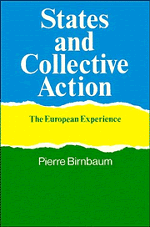Book contents
- Frontmatter
- Contents
- Acknowledgements
- Introduction
- 1 Mobilisation theory and the state: the missing element
- 2 States, free riders and collective movements
- 3 The state and mobilisation for war: the case of the French Revolution
- 4 Ideology, collective action and the state: Germany, England, France
- 5 Individual action, collective action and workers' strategy: the United States, Great Britain and France
- 6 The state versus corporatism: France and England
- 7 The Nazi collective movement against the Prussian state
- 8 Territorial and ethnic mobilisation in Scotland, Brittany and Catalonia
- 9 Nation, state and culture: the example of Zionism
- 10 The state, the police and the West Indians: collective movements in Great Britain
- Conclusion: the end of the state? From differentiation to dedifferentiation
- Notes
- Index
1 - Mobilisation theory and the state: the missing element
Published online by Cambridge University Press: 04 August 2010
- Frontmatter
- Contents
- Acknowledgements
- Introduction
- 1 Mobilisation theory and the state: the missing element
- 2 States, free riders and collective movements
- 3 The state and mobilisation for war: the case of the French Revolution
- 4 Ideology, collective action and the state: Germany, England, France
- 5 Individual action, collective action and workers' strategy: the United States, Great Britain and France
- 6 The state versus corporatism: France and England
- 7 The Nazi collective movement against the Prussian state
- 8 Territorial and ethnic mobilisation in Scotland, Brittany and Catalonia
- 9 Nation, state and culture: the example of Zionism
- 10 The state, the police and the West Indians: collective movements in Great Britain
- Conclusion: the end of the state? From differentiation to dedifferentiation
- Notes
- Index
Summary
From the end of the nineteenth century, the economic system has been disrupted by the emergence of new social categories. The first sociologists, in response to this, emphasised the need for a permanent and quasi-organic social organisation which would limit mobilisation and the risks of fracture to which it gave rise. For the sociologists, society as it actually is has nothing in common with the metaphysical perspectives adopted by revolutionaries in their conceptual reconstruction of a new world. In the wake of Louis de Bonald and Joseph de Maistre, Auguste Comte and Saint-Simon thus sought to stand firm against the rise both of social confrontation and of an abstract individualism which threatened the collective and organic aspects of order. For these theoreticians, the whole (society) had necessarily to prevail over the parts (the individuals). Society therefore seemed to them to be a complex mechanism in which each part depended on all the others. They feared, much as Edmund Burke had done, that the destruction of social structures and the abolition of the estates or of the intermediate groups would in the end only result in the disintegration of the whole and therefore in the triumph of an uncontrollable individualism. They likewise foresaw a time when millions of men would no longer sustain any social relation with each other and would be, as it were, atomised, and would live out their lives under the lofty protection of an all-powerful state.
- Type
- Chapter
- Information
- States and Collective ActionThe European Experience, pp. 11 - 42Publisher: Cambridge University PressPrint publication year: 1988



